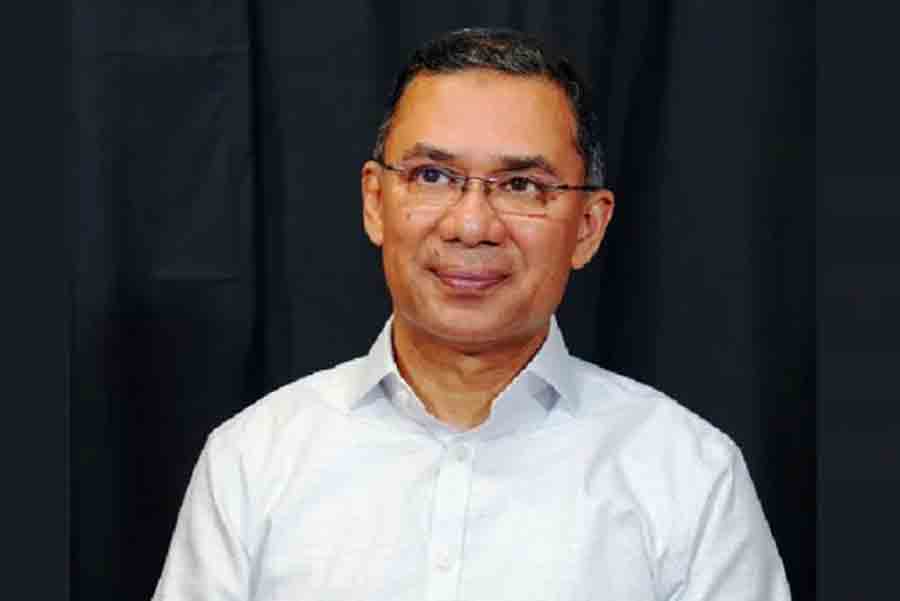
Published :
Updated :

BNP Acting Chairman Tarique Rahman has warned that Bangladesh’s planned graduation from Least Developed Country (LDC) status in 2026 should not proceed without open debate, warning that such a major decision carries long-term economic consequences
In a detailed Facebook post from London on Monday, he said the impact of losing tariff benefits will fall hardest on ordinary families, small factory owners and workers—people who were never consulted but will bear the real cost.
Using examples of a garment factory owner in Gazipur and a young woman in Narayanganj whose family depends on overtime income, Tarique said these “silent crises inside ordinary homes” show why the timeline needs reconsideration.
“Picture a small garment factory owner in Gazipur. He has spent more than a decade building his business, employing over a hundred workers, managing tight margins, and competing in an unforgiving global market. One day, without any visible ceremony, the tariff advantages that once kept his prices competitive quietly disappear. It leads to his orders slowing down and the pressure rises to keep his factory open, his employees paid, and his family safe,” he said.
“Now picture a young graduate in Narayanganj, watching her family disappear into uncertainty. Her father works in a factory. He depends on overtime to make ends meet. When export pressure builds, overtime disappears first. Then shifts are cut. Then jobs. These are not headlines. These are silent crises inside ordinary homes.They never voted on that decision. They were never asked. They were never shown the real numbers,” Tarique added.
He said that is why the debate around Bangladesh’s LDC graduation matteres far more than official statements make it seem.
Tarique said the BNP has stated this before that moving ahead with the 2026 graduation timeline without keeping the option of deferral alive is purely a political decision, being taken by an interim government that does not carry an electoral mandate.
“And yet, is making long-term commitments that will shape the country’s economic future for decades. We are told that delay is ‘impossible', that even asking for it to be deferred would be a ‘humiliation’ which the United Nations (UN) would not even consider. But if we all look closer, history tells a more complex story,” he observed.
The BNP leader said countries such as Angola and Samoa have had their graduation timelines adjusted.
He said the UN rules themselves allow flexibility when countries face economic shocks and asking for time on country shaping consequences is just responsible governance by an interim government.
“But why are we pretending that there is no choice? Why are we limiting our future? By publicly removing the option of deferral, we weaken our own negotiating power. We enter international discussions with our hands already exposed, giving away leverage before we even sit at the table,” the BNP leader said.
Even, he said the government’s own documents acknowledge the business community in Bangladesh already feeling the pressure on the banking sector, stress on foreign exchange, rising debt risk, slowing exports.
Tarique said it is not an argument against graduation, as Bangladesh has earned the right to move forward, but having the “right” to graduate is not the same as being “ready” to graduate.
He added that, in his view, real national strength does not lie in the absence of doubt in decision-making, but in the discipline to ask hard questions before the cost became irreversible.
“Now look at Chattogram Port, the gateway to Bangladesh’s economy. What happens there shapes the lives of millions more than any political speech ever will,” the BNP leader said.
He said recent long-term decisions about the port are not routine but strategic commitments involving a national asset, being pushed forward by an interim government without a democratic mandate to make decisions that bind future generations.
Tarique said what is happening at Chattogram Port mirrors the same pattern seen in the LDC graduation process, where strategic options are being closed, public debate is treated as an inconvenience, and legitimate concerns are brushed aside in the name of speed and “inevitability.”
“Let me be very clear: this is not about personalities or attacking individuals. It is about protecting institutions and the principle that decisions which shape decades of national life should be made by governments that are accountable to the people,” he said.
The BNP leader said no one is arguing against LDC graduation or port reforms.
“The argument is simpler, and more fundamental: the future of a nation should not be locked in by a government that the nation did not elect. Strategic patience is not weakness. Public consultation is not obstruction. Democratic legitimacy is not delay. And in my opinion, perhaps this is the most important truth beneath all of this,” he said.
Tarique said the people of Bangladesh have never been passive about their future as they have endured hardship and sacrifice because they believe in dignity, voice, and choice.
“Their ask is simple: to be heard, to participate, to be respected. That is why so many of us look ahead to the national elections scheduled for February 2026, a chance for the people of Bangladesh to speak, to choose, and to reaffirm a simple truth: The future of this country must be shaped by those who live in it, believing in Shobar age Bangladesh,” he concluded.


 For all latest news, follow The Financial Express Google News channel.
For all latest news, follow The Financial Express Google News channel.